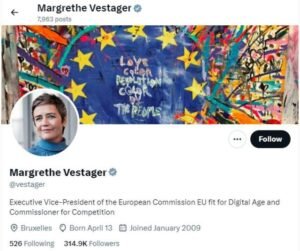The European Union (EU) accused Elon Musk of violating the Digital Services Act (DSA) by defrauding users and maintaining the transparency required by the social media platform.
In a press release on Friday, the EU argued that its “blue ticks” accounts could defraud users, noting: “Since anyone can register to receive this ‘verified’ status, it negatively affects users’ ability to get free and informed decisions about their accounts.”
“Authenticity and the content they interact with. There is evidence that motivated malicious actors are misusing ‘verified accounts’ to deceive users.”
The EU press release highlighted other complaints of non-compliance, noting that X “does not comply” with required advertising transparency and “is not”. failed” to provide sufficient advertising margin and also prevent researchers from accessing the data.
EU member Margrethe Vestager wrote in an X post:
“In our opinion, @X is not complying with the DSA in key areas of transparency. It misleads users, doesn’t provide enough ad space, and prevents researchers from accessing the data. This is the first time we have published preliminary results under the Digital Services Act.”

Her message was soon followed by a response from Tesla CEO Musk.
In response, Musk claimed that the European Commission had proposed to X. A secret agreement he said according to the contract they must censor the speech without telling anyone that X did not agree to the contract The Commission offered X an illegal secret agreement: if we quietly censor the speech without telling anyone anyway, they wouldn’t punish us. Other platforms have agreed to this deal”.
Technology on the Horizon
The official X alert is the first DSA alert. The sweeping law forces digital companies to do more to monitor online content. This is the result of an investigation launched in December 2023.
X becomes the third company in as many weeks to face the wrath of the European Union for violating important new rules, as Brussels warned Apple and Meta to change their behavior or face large fines – also known as digital markets law. for violation of the Act (DMA).
The commission also accused X of failing to comply with advertising transparency requirements — because it “fails to provide a searchable and reliable” ad database — and of not giving researchers access to public information.
“X now has the right to defend itself, but if our position is upheld, we will impose fines and demand significant changes,” said Thierry Breton, the EU’s chief digital officer.
Fines under the DSA can be up to six percent of a company’s total global turnover and force it to make changes to correct violations.
X can access the EU documents and defend itself against Friday’s findings.
Research has no time limit.
According to the DSA, X is subject to stricter rules than one of 25 “very large” online platforms, including Facebook and TikTok, which have more than 45 million monthly active users in 27 countries. X is also at the EU’s crossroads when it comes to reducing content control measures. In May, the EU ordered X to hand over “detailed information and internal documents” and demanded more information about measures taken in elections to reduce the risks of reproductive artificial intelligence.
DSA-related research is currently on Meta’s Facebook and Instagram, as well as TikTok and AliExpress.
The DSA and DMA are both part of a strengthened EU legal army targeting big tech, with EU regulators stepping up enforcement.











